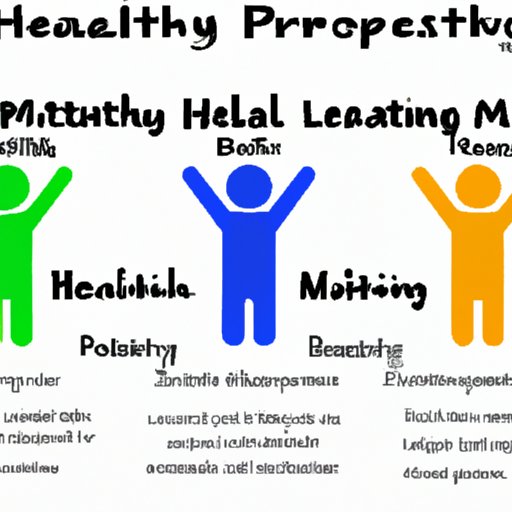Introduction
Good mental health is an essential part of overall wellbeing. It is often defined as a state of mind where individuals are able to cope with the normal stresses of life, have positive relationships with others, and be productive members of society. While everyone experiences changes in their mental health throughout their lives, having good mental health is associated with a range of benefits, including improved physical health, higher quality of life, greater resilience, and better functioning in daily life.

Exploring the Link Between Physical and Mental Health
The relationship between physical and mental health is complex and intertwined. Poor physical health can have a significant impact on mental health, while mental health issues can also lead to physical health problems. According to the World Health Organization (WHO), “there is no health without mental health”, highlighting the importance of recognizing and addressing both physical and mental health needs.
Exercise is one of the most important factors for maintaining physical and mental health. Research has shown that regular physical activity can reduce stress and anxiety, improve mood, enhance cognitive function, and increase self-esteem. Exercise can also help to improve sleep quality, which is essential for good mental health.

Assessing the Role of Lifestyle Habits in Maintaining Good Mental Health
In addition to exercise, other lifestyle habits also play an important role in maintaining good mental health. Getting enough quality sleep is essential for managing stress, regulating emotions, and allowing the brain to process information and recover from the day’s activities. Studies have shown that those who get less than seven hours of sleep a night are more likely to experience symptoms of depression and anxiety.
Nutrition can also affect mental health. Eating a balanced diet that includes plenty of fruits and vegetables can provide the body with essential nutrients and energy, and ensure that the brain functions optimally. Conversely, diets high in processed foods, sugar, and saturated fats can lead to deficiencies in essential vitamins and minerals, which can in turn affect mental health.
Finally, learning effective stress management techniques can help to maintain good mental health. This could involve practicing relaxation techniques such as yoga, mindfulness, or deep breathing, or engaging in activities such as reading, listening to music, or spending time in nature. These activities can help to reduce stress levels and improve mental wellbeing.
Identifying the Warning Signs of Poor Mental Health
It is important to be aware of the warning signs of poor mental health so that steps can be taken to address any issues. Common signs include feeling overwhelmed, anxious, or depressed; difficulty sleeping; withdrawing from social activities; feeling disconnected from family and friends; and changes in eating habits. Other warning signs include increased irritability, feelings of helplessness, and difficulty concentrating.
Certain risk factors can also increase the likelihood of developing mental health issues. These may include poverty, childhood trauma, substance abuse, chronic illness, family history of mental health issues, or stressful life events. It is important to be aware of these risk factors and take steps to reduce them if possible.

Investigating Strategies for Improving Mental Health
If you are concerned about your mental health, there are several strategies you can use to improve it. Seeking professional support is often beneficial, as a qualified mental health professional can assess your mental health and recommend appropriate treatments such as counseling or medication. Support groups can also be helpful, as they provide an opportunity to share experiences and advice with others who are going through similar experiences.
In addition to seeking professional help, there are also several self-help strategies that can be used to improve mental health. These include exercising regularly, eating a balanced diet, getting enough sleep, engaging in relaxation techniques, and avoiding alcohol and drugs. It can also be beneficial to practice gratitude and focus on the positive aspects of life, as this can help to boost mood and self-esteem.
Conclusion
Good mental health is essential for overall wellbeing. It is associated with a range of benefits, including improved physical health, higher quality of life, greater resilience, and better functioning in daily life. Exploring the link between physical and mental health, assessing the role of lifestyle habits in maintaining good mental health, identifying warning signs of poor mental health, and investigating strategies for improving mental health are all important steps in ensuring good mental health.
If you are concerned about your mental health, seeking professional support and engaging in self-help strategies can be beneficial. Professional support may involve seeking therapy or medication, while self-help strategies include exercising regularly, eating a balanced diet, getting enough sleep, practicing relaxation techniques, and focusing on the positive aspects of life.
(Note: Is this article not meeting your expectations? Do you have knowledge or insights to share? Unlock new opportunities and expand your reach by joining our authors team. Click Registration to join us and share your expertise with our readers.)
